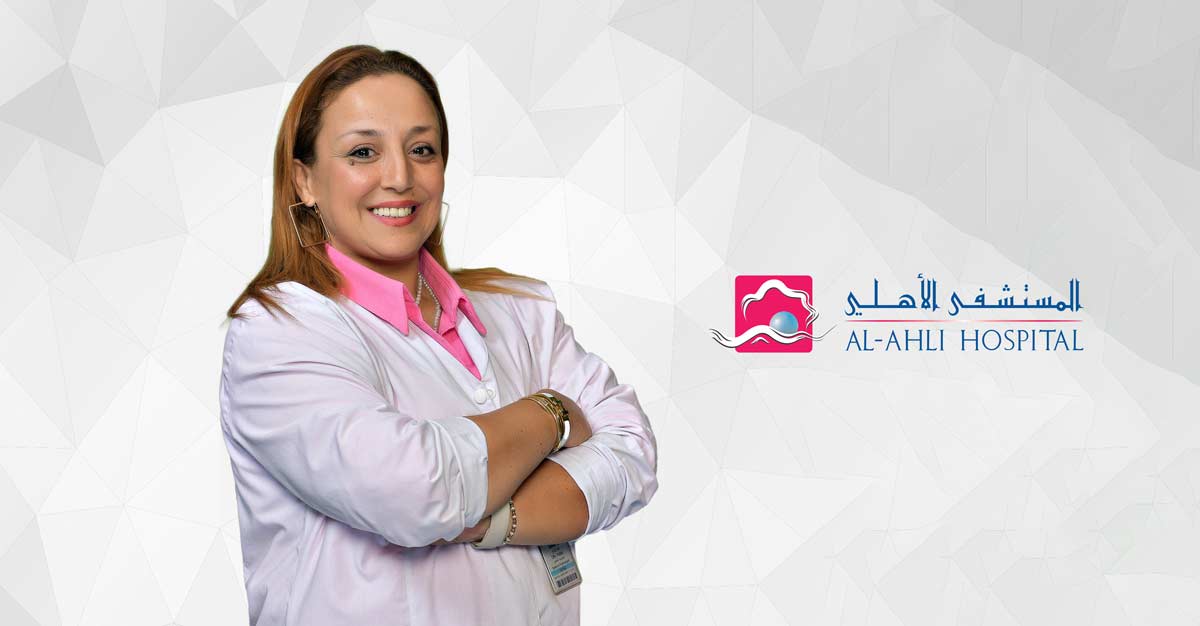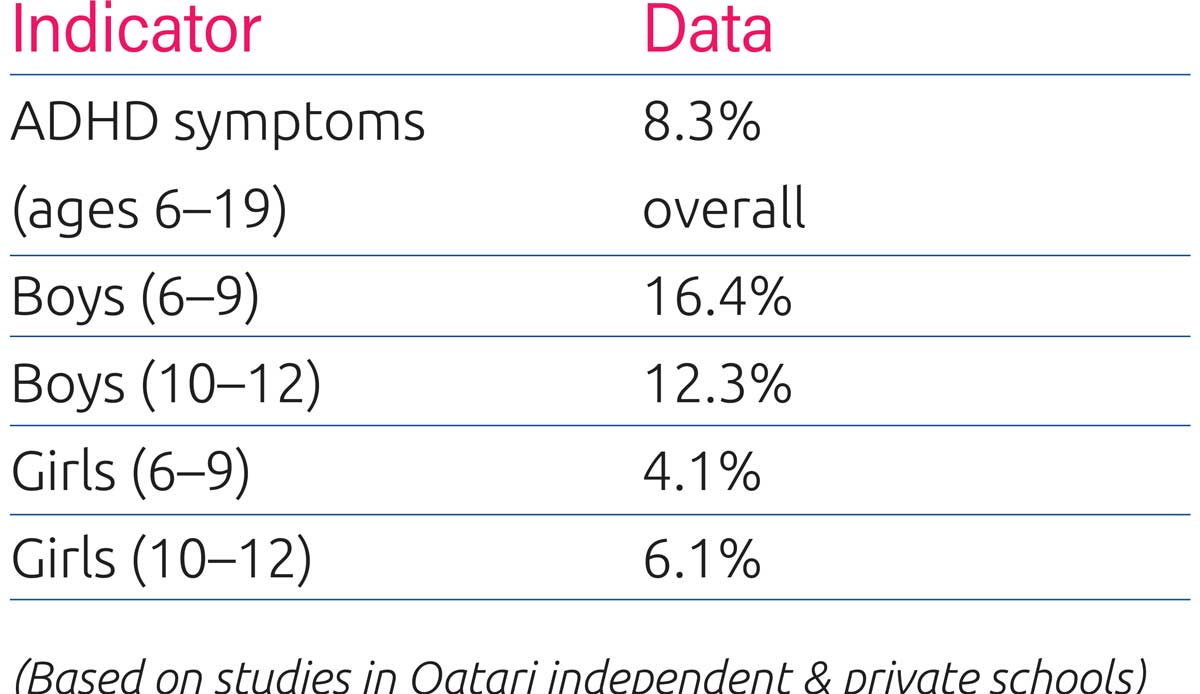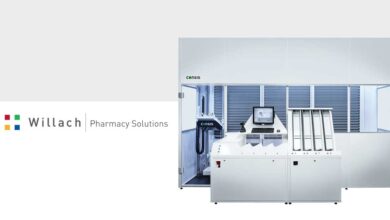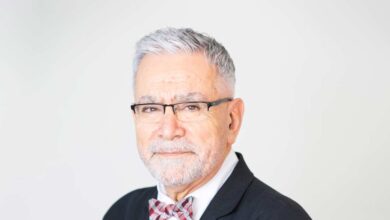Speech & Language Therapy: Empowering Children with ADHD
Ms. Olfa Fellah, a seasoned speech and language therapist at Al-Ahli Hospital/Qatar

Attention Deficit/Hyperactivity Disorder (ADHD) affects children worldwide, including here in Qatar. While medical management often centers on pharmacology and behavioral therapy, one crucial, and sometimes overlooked, component is speech and language therapy. At Al-Ahli Hospital, Ms. Olfa Fellah, a seasoned speech and language therapist, leads this essential service with proven success.
Understanding ADHD in Qatar
Studies show that ADHD prevalence in Qatar aligns with global averages, approximately 8–9% of school-age children. A cross-sectional survey of independent and private schools revealed that 8.3% of students aged 6–19 exhibited ADHD symptoms, with boys showing higher rates: 16.4% for ages 6–9 and 12.3% for ages 10–12, compared to 4.1% and 6.1% in girls, respectively. This aligns with regional figures from the Middle East, where prevalence ranges between 7.8–11.1%. Local institutions like HMC and Sidra Medicine offer dedicated Child & Adolescent Mental Health Services (CAMHS), complemented by the Qatar ADHD Support Group established in 2008. They provide comprehensive assessment, parent–teacher training, and multidisciplinary support.
Why ADHD is Rising and Why It Matters
Globally, ADHD is driven by a combination of genetic predisposition, prenatal factors (such as tobacco or substance exposure), and early childhood environmental influences. In Qatar, lifestyle changes, including increased screen time, urban living, and stress, may also exacerbate symptoms among vulnerable children. The impact is significant: ADHD can impair academic performance, social interactions, and emotional well-being. Untreated ADHD in adolescents may even elevate the risk of traffic accidents, injury, and psychiatric comorbidities.
The Role of Speech and Language Therapy
Although ADHD is not a primary speech disorder, many children struggle with language processing, social communication, working memory, and executive functioning. Speech therapy supports these areas by:
- Enhancing expressive and receptive language skills
- Improving organization and clarity of speech, supporting academic literacy
- Promoting social communication skills, vital for peer and classroom interaction
- Providing strategies for memory, focus, and task sequencing
At Al-Ahli Hospital, the Speech & Language Therapy Unit, integrated with the Pediatrics Department, offers advanced diagnostic and intervention services for these challenges.
Spotlight: Ms Olfa Fellah, Leader in Therapy Excellence
Ms. Olfa Fellah is a licensed Speech & Language Therapist (QCHP license A18924) with over 15 years of experience spanning Tunisia, France (Paris), and London. Fluent in Arabic, English, and French, she brings a multicultural perspective essential for Qatar’s diverse population.
At Al-Ahli Hospital, she offers:
- Individualized therapy plans tailored to each child’s unique ADHD profile
- Parental coaching sessions, equipping caregivers with strategies to support language development at home
- Collaboration with pediatricians, psychologists, and educators for a holistic approach
- Continuous quality improvement, bolstered by Al-Ahli’s accreditation and guest-centered care ethos
Parents report marked improvements in their children’s clarity of expression, confidence in school, and participation in social settings.
Al-Ahli’s Strengths in ADHD Management
Integrated Multidisciplinary Team
Al-Ahli Hospital enlists over 1,750 clinicians across 30+ specialties. For ADHD, this includes pediatricians, child psychiatrists, psychologists, and Ms. Fellah’s speech team, delivering coordinated care under one roof.
Evidence-Based & Personalized Care
Therapy sessions are based on rigorous assessment protocols, standardized tools, parental and teacher input, to tailor goals and track progress.
World-Class, Guest-Centered Environment
Al-Ahli’s five-star facilities provide comfort and privacy for therapy sessions. Their accreditation in professional education underscores a commitment to ongoing staff training and excellence.
Cultural & Linguistic Adaptability
With its multicultural staff, including Ms. Fellah, the hospital supports therapy in Arabic, English, and French.
Treatment Strategies & Best Practices in Qatar
Combining global guidelines with local initiatives, ADHD treatment in Qatar incorporates:
- Early Detection: Through school screening clinics and CAMHS
- Pharmacotherapy: Stimulants like methylphenidate or atomoxetine remain first line for moderate to severe cases
- Behavioral & Psychosocial Therapy: Includes CBT, parent training, and school coordination
- Speech & Language Intervention: Tailored to ADHD-related language, executive, and social difficulties
- Ongoing Monitoring: Regular follow-up includes therapy progress, medication reviews, and school feedback
- Family & School Engagement: Qatar ADHD Support Group and CAMHS foster training and community awareness
Recommendations for Parents and Guardians
- Seek early evaluation, especially if your child shows persistent difficulties in speaking, listening, organizing thoughts, or socializing
- Choose centres offering multidisciplinary care, including speech therapy
- Engage actively in sessions and implement strategies at home
- Monitor progress holistically, not just academic grades, but also language fluency and confidence
The Road Ahead for Qatar
Qatar’s healthcare infrastructure has advanced significantly, with robust CAMHS and innovative efforts by institutions like Al-Ahli. However, challenges remain, including continuing investment in school services, training more specialists, and reducing stigma. Al-Ahli contributes through:
- Professional development programs for speech therapists
- Collaborative partnerships with schools and HMC
- Enhanced study and tracking of outcomes in speech therapy for ADHD
In Focus: Spotlight Story
A case study (anonymized)
Seven-year-old Zayd, diagnosed with ADHD, struggled with organizing his speech and understanding instructions. Through weekly speech and language therapy with Ms. Fellah, integrated with behavior strategies and medication, he progressed from fragmented sentences to coherent storytelling, improved classroom participation, and increased self-esteem. Ongoing feedback from his parents and teachers confirmed both academic gains and social advancement.
Conclusion
Speech and language therapy is a vital, and often under-recognized, pillar in holistic ADHD care. At Al-Ahli Hospital, Ms. Olfa Fellah combines clinical excellence with compassion, delivering tailored support that empowers children to speak clearly, think coherently, and interact confidently. Backed by Qatar’s rising focus on comprehensive mental health, this approach is reshaping outcomes for children with ADHD across the country.
Sidebar: Quick ADHD Facts in Qatar

www.ahlihospital.com














